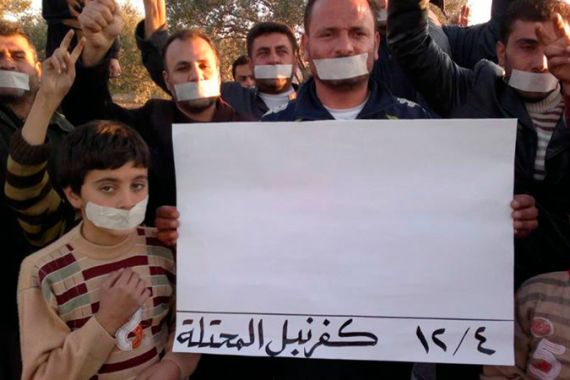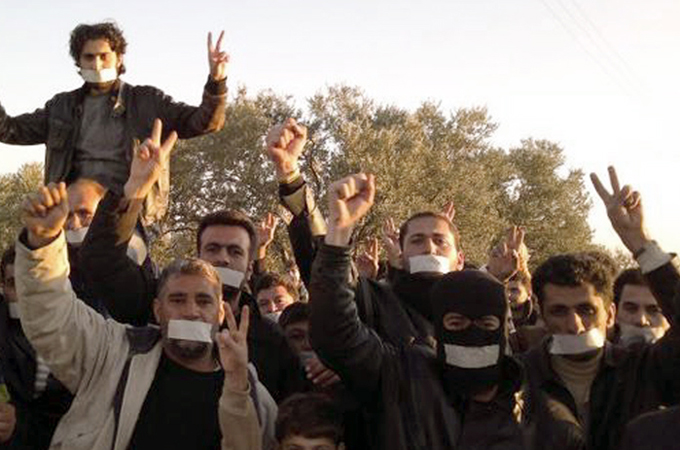Syrian opposition calls for poll boycott
More than 14.5 million are eligible to vote in first such election since local administrations were given more power.

 |
| Violence and boycott calls are likely to keep many of the 14.5m eligible Syrians away from local polls [Reuters] |
Syrians are casting their ballots in local elections for the first time since the uprising against President Bashar al-Assad began nine months ago.
Turnout for Monday’s elections, which began at 7:00am local time (05:00 GMT), is expected to be low, amid calls by activists to boycott the polls and reports of continued violence across the country.
The official SANA news agency reported that people were “flocking to the polls” on Monday morning.
Khalaf Azzawi, the chairman of the electoral commission, was quoted by SANA on Sunday as saying: “The polling stations have been equipped with all the means and mechanisms that would guarantee the voters the freedom to chose the candidates who will represent them.”
In Damascus, the capital city, and Aleppo, the second largest city, pictures of candidates have been posted in the streets, but residents noted that less campaigning activities were held this year than ahead of the last local elections in 2007.
In restive cities rocked by anti-government protests, including Homs, Hama and Deraa, campaigning activities were almost nonexistent.
“There are only two signs calling people to vote in Hama: one in the Assi Square and another at the City Council,” a resident of the central city told Al Jazeera.
“Activists distributed leaflets in the city calling on residents to boycott the elections,” he said.
A resident from Homs’ Inshaat area said: “I didn’t even know an election was taking place. The people of Homs have removed every picture of Bashar al-Assad from the streets, so don’t expect to see pictures of candidates who are no more than stooges of the regime.”
Homs has endured the largest number of casualties in the government forces’ crackdown on protests. The UN estimates that more than 4,000 people have been killed across the country since March.
Preparations for the voting took place as the Local Co-ordination Committees activist network reported that at least 18 people were killed by security forces on Sunday.
Writer and activist Louay Hussein, speaking to Al Jazeera from Damascus, said: “The government is trying to show that the situation in Syria is normal, that it is on track with reforms. This is simply another maneuver from the regime that we do not buy into.”
More than 14.5m Syrians are eligible to cast their ballots, according to state media, including thousands of Kurds who would be allowed to vote for the first time since a presidential decree was issued in April granting them Syrian nationality.
Radif Mustafa, the head of the Kurdish Committee for Human Rights in the northeastern province of Qamishli, told Al Jazeera that all Kurdish political parties and popular committees would boycott the polls.
Local elections take place every four years, but Monday’s are the first since Assad issued the local administration law in August which gives the local administrations more powers and financial independence.
An official in Damascus told Al Jazeera that “the new law is based on international standards. The electoral process is – for the first time – being supervised by judicial committees as opposed to the interior ministry, the way it used to be”.
Previously, elections were conducted according to the “closed lists” system, which guaranteed 50 per cent of all municipal seats to the National Progressive Front coalition with the biggest share allocated to members of the ruling al-Baath party.
This year, “there are no lists and people can vote for whoever they want”, said the official, who was speaking on condition of anonymity because he was not authorised to speak to media.
But Nabil Samman, head of the Centre for Research and Documentation in Damascus, told Al Jazeera that not only is the timing of the elections wrong, but they are useless given the fact that the constitution has not been amended.
“The ruling coalition has packaged itself as a ‘National Unity Coalition’ but nothing has changed,” he said.
Article eight of the constitution, which states that al-Baath party is the leading party in the society and the state, has not been scrapped yet.
Assad had formed a constitutional committee in October mandated with authoring a new constitution.
Assad said parliamentary elections would be held in February 2012.